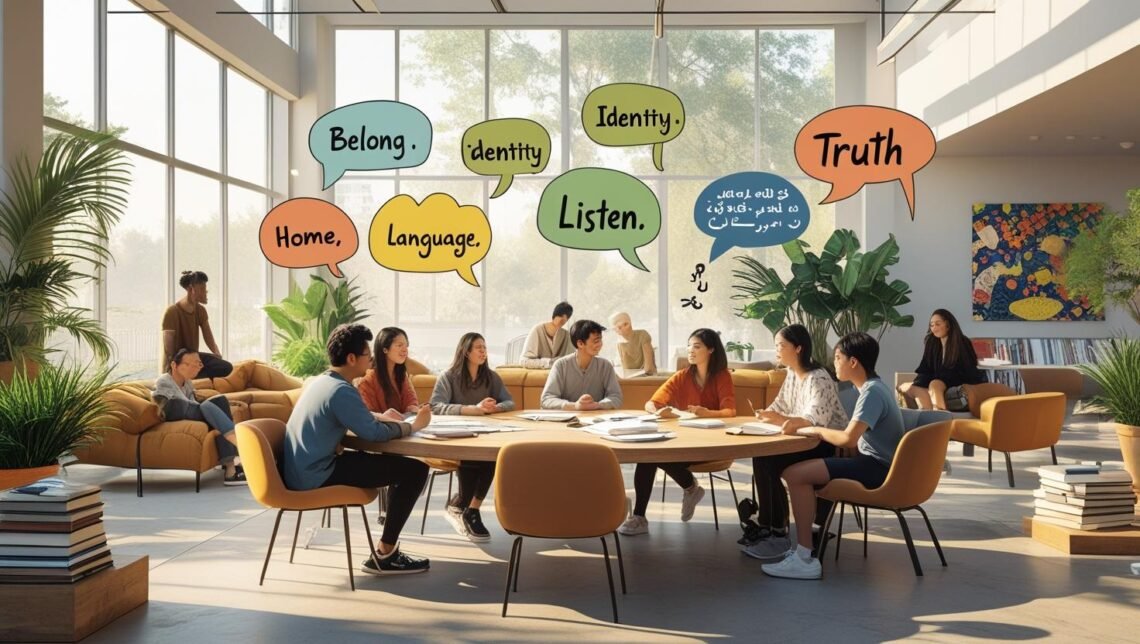We live in a time of many tongues. Open any social feed, step into any urban café, listen to the layered voices on a morning train—one hears not just accents and idioms, but whole frameworks of meaning jostling for space. We inhabit a digital Babel, where every group speaks its truth, its pain, its pride. And while some days this feels like a glorious tapestry, other days it feels like we are building towers again, each community raising its own structure of language and longing, brick by brick, word by word, daring the heavens to notice.
The story of Babel, nestled early in our sacred texts, is often told as a tale of divine interruption. Humanity, unified by language, seeks to make a name for itself, to build upward, to reach into mystery on its own terms. God, seeing the danger in such homogeneity, scatters them, not as punishment alone, but perhaps also as a mercy. For in the scattering, difference is born. Language diversifies. The world becomes plural.
What if Babel was not the fall of meaning, but its flowering?
This, of course, does not come without tension. Language binds us to our people. It gives us identity, rhythm, humour, and grief. Yet the very particularity that nurtures belonging can also fuel division. We see it everywhere, in culture wars over pronouns and poetry, in arguments about what words mean and who gets to define them, in the quiet ache of the immigrant whose tongue stumbles in a new land. We want to be understood, yes, but even more, we want to be known.
And so, we cling to our dialects of self. We join linguistic tribes, crafting vocabularies that name our wounds and signal our values. This is both natural and necessary. It is also incomplete. For if all we do is name ourselves in distinction from others, we risk mistaking fragmentation for freedom. We risk forgetting that difference, while real, is not the enemy of connection. It is its very precondition.
Perhaps the real crisis of Babel is not that we speak different languages, but that we stop listening for the harmonies between them. That we grow suspicious of translation, treating it not as a bridge but a betrayal. That we come to believe that mutual understanding must always require mutual agreement.
There is wisdom to be found in Pentecost, that strange and luminous sequel to Babel. There, the miracle is not a return to a single language. It is the gift of hearing. Each person, says the text, hears in their own tongue. The Spirit does not erase difference. It dignifies it. And it invites us into a conversation that is deeply plural, yet still capable of shared wonder.
In this age of cultural fragmentation, we need more than fluent speech. We need faithful listening. We need a posture of welcome toward languages not our own, toward stories that unsettle our categories, and toward people who do not pronounce the world as we do. Not all voices must agree, but all voices must be heard if we are to be more than just a collection of competing Babels.
Language, at its best, is not about control but communion. It is the means by which we offer ourselves to the other and receive the other in turn. It is a hospitality of the tongue. A shared meal of meaning, even when the recipes differ.
So perhaps the challenge of our time is not to find a common language, but to become common learners. To let our speech be shaped by those whose metaphors we do not yet understand. To befriend accents we once dismissed. To believe that mutual belonging is still possible in a world of many names.
This week, notice the ways language creates both distance and connection in your conversations. When you encounter a word, phrase, or worldview that feels foreign or strange, resist the reflex to judge or dismiss. Instead, ask a curious question. Learn the story behind the speech. Practise the art of translation—not to dilute difference, but to deepen understanding.





